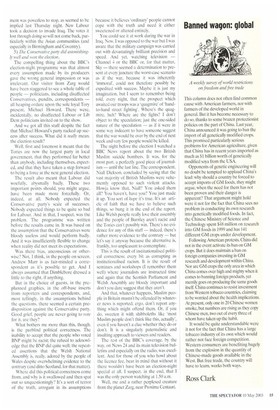Banned wagon: global
A weekly survey of world restrictions on freedom and free trade This column does not often find common cause with American farmers, nor with farmers of the developed world in general. But it has become necessary to do so, thanks to some brazen protectionist policies on the part of China. Last year, China announced it was going to ban the import of all genetically modified crops. This promised particularly serious problems for American agriculture, given that China has in recent years imported as much as $1 billion worth of genetically modified soya from the USA.
Opponents of genetic engineering will no doubt be tempted to applaud China's lead: why should a country be forced to accept imports of GM foods, they might argue, when the need for them has not been proven and their danger is apparent? That argument might hold were it not for the fact that China sees no problem in conducting its own research into genetically modified foods. In fact, the Chinese Ministry of Science and Technology spent $48 million on research into GM foods in 1999 and has 141 different GM crops under development.
Following American protests, China did not in the event activate its ban on GM crops. But it does maintain a ban on foreign companies investing in GM research and development within China. Nor are GM crops the only area in which China comes over high and mighty when it comes to banning foreign products, yet merrily goes on producing the same goods itself. China continues to resist investment from Western tobacco countries, claiming to be worried about the health implications. At present, only one in 20 Chinese women smoke, but numbers are rising as they copy Chinese men, two out of every three of whom have taken up the habit.
It would be quite understandable were it not for the fact that China has a large tobacco industry of its own which would rather not face foreign competition. Western consumers are benefiting hugely from the explosion in the quantity of Chinese-made goods available in the West. But free trade, the country will have to learn, works both ways.
Ross Clark


































































 Previous page
Previous page